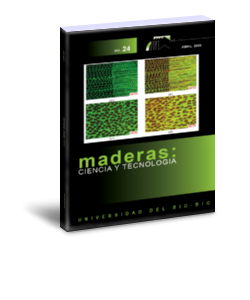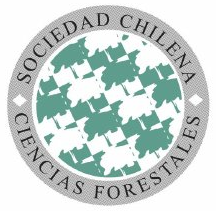Characterization of Acrocarpus fraxinifolius wood submitted to heat treatment
DOI:
https://doi.org/10.4067/s0718-221x2022000100454Keywords:
Acrocarpus fraxinifolius, chemical analyses, Indian cedar, mechanical properties, thermal modification, thermal treatmentAbstract
Aiming to provide greater visibility for the wood species Acrocarpus fraxinifolius, the present study sought to analyze the influence of heat treatment on an industrial scale applied to wood species, also popularly known as Indian cedar. The heat treatment was carried out in an autoclave, with temperature and pressure control, and with saturated steam injection, for temperatures 155 ºC, 165 ºC, 175 ºC, and 185 ºC. Physical, chemical, and mechanical tests were carried out for the analyzed wood. The content of holocellulose and total lignin decreased, while the content of extractives showed a substantial increase. The density increased after the heat treatment, however the treated wood showed cracks, and these cracks influenced the significant loss of the values of the mechanical properties of compression, tension, and flexion. The shear showed strength gain for the temperature of 155 ºC, and the wood treated at 165 ºC was equivalent to untreated wood. The woods submitted to temperatures of 175 ºC and 185 ºC presented strength losses. The heat treatment in question contributes to increase the visibility, use and market value of wood.
Downloads
References
Associação Brasileira de Normas Técnicas. ABNT. 1997. NBR 7190: Projeto de estruturas de madeira. Rio de Janeiro, RJ, Brazil.
Ayadi, N.; Lejeune, F.; Charrier, F.; Charrier, B.; Merlin, A. 2003. Color stability of heat-treated wood during artificial weathering. Holz Roh Werkst 61: 221-226. https://doi.org/10.1007/s00107-003-0389-2
Batista, D.C.; Oliveira, T.S.; Paes, J.B.; Nisgoski, S.; Muñiz, G.I.B. 2018. Effect of the Brazilian process of thermal modification on the physical properties of Eucalyptus grandis juvenile wood. Maderas-Cienc Tecnol 20(4): 715-724. https://doi.org/10.4067/S0718-221X2018005041701
Batista, D.C.; Tomaselli, I.; Klitzke, R.J. 2011. Effect of time and temperature of thermal modification on the reduction of maximum swelling of Eucalyptus grandis Hill ex Maiden wood. Cienc Florest 21(3): 533-540. http://www.bioline.org.br/abstract?cf11053
Brito, J.O.; Garcia, J.N.; Bortoletto Júnior, G.; Pessoa, A.M.C.; Silva, P.H.M. 2006. The density and shrinkage behavior of Eucalyptus grandis wood submitted to different temperatures of thermo retification. Cerne 12(2): 182-188. https://www.redalyc.org/pdf/744/74412209.pdf
Cademartori, P.H.G.; Missio, B.D.M.; Gatto, D.A. 2015. Effect of thermal treatments on technological properties of wood from two Eucalyptus species. An Acad Bras Ciênc 87(1): 471-481. http://dx.doi.org/10.1590/0001-3765201520130121
Cademartori, P.H.G.; Schneid, E.; Gatto, D.A.; Stangerlin, D.M.; Beltrame, R. 2013. Thermal modification of Eucalyptus grandis wood: Variation of colorimetric parameters. Maderas-Cienc Tecnol 15(1): 57-64. https://doi.org/10.4067/S0718-221X2013005000005
Calonego, F.W.; Severo, E.T.D.; Latorraca, J.V. 2014. Effect of thermal modification on the physical properties of juvenile and mature woods of Eucalyptus grandis. FLORAM 21(1): 108-113. http://dx.doi.org/10.4322/floram.2014.004
Carvalho, P.E.R. 1998. Espécies introduzidas alternativas às dos gêneros Pinus e Eucalyptus para reflorestamento no Centro-sul do Brasil. Colombo: Embrapa Florestas. CRC Press: 74-99. https://ainfo.cnptia.embrapa.br/digital/bitstream/item/105281/1/EspeciesIntroduzidas0001.pdf
Chang, S.T.; Hon, D.N.S.; Feist, W.C. 1982. Photodegradation and photoprotection of wood surfaces. Wood Fiber Science 14(2): 104-107.
Conte, B.; Missio, A.L.; Pertuzzatti, A.; Cadermartori, P.H.G.; Gatto, D.A. 2014. Physical and colorimetric properties of Pinus elliottii var. elliottii thermally treated wood. Sci For 42(104): 555-563. https://www.ipef.br/publicacoes/scientia/nr104/cap09.pdf
Crespo, G.R.; Torres, U.M.; Valenzuela, H.L.; Poblete, W.H. 2014. Propiedades químicas, color y humectabilidad de partículas de Laureliopsis philippiana (tepa) con y sin tratamiento térmico. Maderas-Cienc Tecnol 15(3): 337–348. https://doi.org/10.4067/S0718-221X2013005000026
Elaieb, M.; Candelier, K.; Pétrissans, A.; Dumarçay, S.; Gérardin, P.; Pétrissans, M. 2015. Heat treatment of tunisian soft wood species: Effect on the durability, chemical modifications and mechanical properties. Maderas-Cienc Tecnol 17(4): 699-710. https://doi.org/10.4067/S0718-221X2015005000061
Esteves, B.M.; Pereira, H.M. 2009. Wood modification by heat treatment: A review. BioResources 4(1): 370-404.
Esteves, B.M.; Graça, J.; Pereira, H. 2008. Extractive composition and summative chemical analysis of thermally treated eucalypt wood. Holzforschung 62(3): 344–351. https://doi.org/10.1515/HF.2008.057
Esteves, B.M.; Videira, R.; Pereira, H. 2011. Chemistry and ecotoxicity of heat-treated pine wood extractives. Wood Sci Technol 45(4): 661–676.
https://doi.org/10.1007/s00226-010-0356-0
Esteves, B.; Ayata, U.; Cruz-Lopes, L.; Brás, I; Ferreira, J.; Domingos, I. 2022. Changes in the content and composition of the extractives in thermally modified tropical hardwoods. Maderas-Cienc Tecnol 24(2022): 1-28. http://dx.doi.org/10.4067/s0718-221x2022000100422
Fengel, D.; Wegener, G. 2003. Wood - Chemistry, ultrastructure, reactions. Walter de Gruyter & Co., New York, USA.
Firmino, A.C.; Moraes, W.B.; Furtado, E.L. 2015. Primeiro relato de Ceratocystis fimbriata causando seca em Acrocarpus fraxinifolius no Brasil. Summa Phytopathol 41(2): 160. https://doi.org/10.1590/0100-5405/1954
Gomide, J.L.; Demuner, B.J. 1986. Determinação do teor de lignina em material lenhoso: Método Klason modificado. O Papel 47(8): 36-38.
Griebeler, C.G.O.; Matos, J.L.M.; Muniz, G.I.B.; Nisgoski, S.; Batista, D.C.; Rodríguez. 2018. Colour responses of Eucalyptus grandis wood to the Brazilian process of thermal modification. Maderas-Cienc Tecnol 20(4): 661-670.https://doi.org/10.4067/S0718-221X2018005041201
Garcia, R.A.; Lopes, J.O.; Nascimento, A.M.; Latorraca, J.V.F. 2014. Color stability of weathered heat-treated teak wood. Maderas-Cienc Tecnol 16(4): 453-462. https://doi.org/10.4067/S0718-221X2014005000037.
Gouveia, F.N. 2008. Thermal treatments for the colorimetric stabilization of tropical hardwood (in Portuguese). Ph.D thesis, Universidade de Brasília, Brasília, Brazil. https://repositorio.unb.br/bitstream/10482/1171/1/TESE_2008_FernandoNunesGouveiapdf
Gunduz G.; Korkut, S.; Korkut, D.S. 2008. The effects of heat treatment on physical and technological properties and surface roughness of Camiyanı Black Pine (Pinus nigra Arn. subsp. pallasiana var. pallasiana) wood. Bioresour Technol 99(7): 2275–2280. https://doi.org/10.1016/j.biortech.2007.05.015
Gunduz G.; Korkut, S.; Aydemir, D.; Bekar, I. 2009. The density, compression strength and surface hardness of heat treated hornbeam (Carpinus betulus) wood. Maderas-Cienc Tecnol 11(1): 61-70. http://revistas.ubiobio.cl/index.php/MCT/article/view/1430
Higa, A.R.; Prado, C. 1998. Acrocarpus fraxinifolius Wight & Arn. In: Espécies não tradicionais para plantios com finalidades produtivas e ambientais. Galvão, A.P.M. (Ed.). Colombo: Embrapa Florestas. CRC: 57-60.
Hill, C.A.S. 2006. Wood Modification: Chemical, thermal and other processes. John Wiley & Sons Ltd., Chichester, England.
https://www.academia.edu/34614303/_Callum_A_S_Hill_Wood_Modification_Chemical_T_BookFi_
Homan, W.J.; Jorissen, A.J.M. 2004. Wood modification developments. Heron 49(4), 361-385. http://heronjournal.nl/49-4/5.html
Indústria Brasileira de Árvores - IBÁ. 2019. Relatório IBÁ 2019. São Paulo, Brazil. https://iba.org/datafiles/publicacoes/relatorios/iba-relatorioanual2019.pdf
Iwakiri, S.; Potulski, D.C; Sanches, F.G.; Silva, J.B.; Trianoski, R.; Pretko, W.C. 2014. Avaliação do potencial de uso da madeira de Acrocarpus fraxinifolius, Grevilea robusta, Melia azedarach e Toona ciliata para produção de painéis osb. Cerne 20(2): 277-284. https://doi.org/10.1590/01047760.201420021201
Kamperidou, V.; Barboutis, I. 2021. Natural weathering performance of thermally treated poplar and black pine wood. Maderas-Cienc Tecnol 23(24): 1-12. http://dx.doi.org/10.4067/s0718-221x2021000100424.
Korkut, S.; Akgul, M.; Dundar, T. 2008. The effects of heat treatment on some technological properties of Scots pine (Pinus sylvestris L.) wood. Bioresour Technol 99(6): 1861–1868. https://doi.org/10.1016/j.biortech.2007.03.038
Lengowski, E.C.; Bonfatti Júnior, E.A.; Nisgoski, S.; Muñiz, G.I.B.; Klock, U. 2021. Properties of thermally modified teakwood. Maderas-Cienc Tecnol 23(10): 1-16. http://dx.doi.org/10.4067/s0718-221x2021000100410
Lopes, J.O.; Cáceres, C.B.; Hernández, R.E.; Garcia, R.A. 2022. Effect of the thermal treatment on the chemical components, sorption, and shrinkage properties of Tectona grandis juvenile wood. Maderas-Cienc Tecnol 24(18): 1-27. http://dx.doi.org/10.4067/S0718-221X2022005XXXXXX
Lorenzi, H.; Souza, H.M. de; Torres, M.A.V.; Bacher, L.B. 2003. Árvores exóticas no Brasil: madeireiras, ornamentais e aromáticas. Nova Odessa: Instituto Plantarum de Estudos da Flora. CRC Press: 368 p.
Minitab. 2020. Minitab statistical software, Minitab Inc. Ltd. UK. https://www.minitab.com/en-us/products/minitab/
Moura, L.F.; Brito, J.O. 2011. Effect of thermal rectification on colorimetric properties of Eucalyptus grandis and Pinus caribaea var. hondurensis woods. Sci For 39(89): 69-76. https://www.ipef.br/publicacoes/scientia/nr89/cap07.pdf
Moura, L.F.; Brito, J.O. Bortoletto Júnior, G. 2012. Efeitos da termorretificação na perda de massa e propriedades mecânicas de Eucalyptus grandis e Pinus caribaea var. Hondurensis. Floresta 42(2): 305-314. http://dx.doi.org/10.5380/rf.v42i2.17635
Nisgoski, S.; Trianoski, R.; Muñiz, G.I.B.; Matos, J.L.M.; Stygar, M. 2012. Variação radial das estruturas da madeira de Acrocarpus fraxinifolius Wight & Arn. FLORAM 19(3): 316-324. http://dx.doi.org/10.4322/floram.2012.037
Oliveira, C.A.B.; Silva, J.V.F.; Bianchi, N.A.; Campos, C.I.; Oliveira, K.A.; Galdino, D.S.; Bertolini, M.S.; Morais, C.A.G.; Souza, A.J.D.; Molina, J.C. 2020. Influence of Indian cedar particle pretreatments on cement-wood composite properties. Bioresources 15(1): 1656-1664. http://doi.org/10.15376/biores.15.1.1656-1664
Okon, K.E.; Udoakpan, U.I. 2019. Physicochemical properties of Pinus massoniana wood subjected to silicone oil heat treatment. Maderas-Cienc Tecnol 21(4): 531-544. http://dx.doi.org/10.4067/S0718-221X2019005000409
Pincelli , A.L.P.S.M.; Moura, L.F.; Brito, J.O. 2012. Effect of thermal rectification on colors of Eucalyptus saligna and Pinus caribaea woods. Maderas-Cienc Tecnol 14(2): 239-248. http://dx.doi.org/10.4067/S0718-221X2012000200010
Prado, C.A.; Pereira, J.C.D.; Mattos, P.P.; Schaitza, E.G.; Higa, A.R. 2003. Physical and chemical characteristics of Acrocarpus fraxinifolius Wight & Arn. Colombo: Embrapa Florestas. CRC Press: 14p. http://www.infoteca.cnptia.embrapa.br/infoteca/handle/doc/281002
Salman, S.; Thévenon, M.F.; Pétrissans, A.; Dumarçay, S.; Candelier, K.; Gérardin, P. 2017. Improvement of the durability of heat-treated wood against termites. wood. Maderas-Cienc Tecnol 19(3): 317-328. http://dx.doi.org/10.4067/S0718-221X2017005000027
Santos, C.P.; Reis, I.N.; Moreira, J.E.B.; Brasileiro, L.B. 2001. Papel: como se fabrica? Revista Química Nova na Escola 14: 3-7.
http://qnesc.sbq.org.br/online/qnesc14/v14a01.pdf
Schneid, E.; Cademartori, P. H. G.; Gatto, D. 2014. The effect of thermal treatment on physical and mechanical properties of Luehea divaricata hardwood. Maderas-Cienc Tecnol 16(4): 413-422. https://doi.org/10.4067/S0718-221X2014005000033
Shukla, S. R. 2019. Evaluation of dimensional stability, surface roughness, colour, flexural properties and decay resistance of thermally modified Acacia uriculiformis. Maderas-Cienc Tecnol 21(4): 433-446. http://dx.doi.org/10.4067/S0718-221X2019005000401
Sivrikaya, H.; Can, A.; De Troya, T.; Conde, M. 2015. Comparative biological resistance of differently thermal modified wood species against decay fungi, Reticulitermes grassei and Hylotrupes bajulus. Maderas-Cienc Tecnol 17(3): 559-570. http://dx.doi.org/10.4067/S0718-221X2015005000050
Silva, M.R.; Machado, G.O.; Christóforo, A.L.; Brito, J.O.; Govone, J.S.; Calil Junior, C. 2013. Resistência do Pinus taeda termorretificado. Madeira: Arquitetura e Engenharia 14(34): 55-62. http://madeira.set.eesc.usp.br/article/view/360/pdf
Soratto, D.N. 2012. Efeito das variáveis do tratamento térmico nas propriedades da madeira de Eucalyptus sp. Master’s dissertation, Federal University of Viçosa. Viçosa, Brazil. http://locus.ufv.br/handle/123456789/3121
Sun, B.; Wang, X.; Liu, J. 2013. Changes in dimensional stability and mechanical properties of Eucalyptus pellita by melamine–urea–formaldehyde resin impregnation and heat treatment. Eur J Wood Prod 71(5): 557–562. http://doi.org/10.1007/s00107-013-0700-9
Sundqvist, B. 2004. Colour changes and acid formation in wood during heating. PhD thesis, Lulea University of Technology. Skellefta, Sweden. http://www.diva-portal.org/smash/record.jsf?pid=diva2%3A999349&dswid=-5837
Technical Association of The Pulp and Paper Industry. TAPPI. 1985. T257-CM-85: Sampling and preparing wood for analysis. Atlanta, USA.
Technical Association of The Pulp and Paper Industry. TAPPI. 1997. T264-CM-97: Preparation of wood for chemical analysis. Atlanta, USA.
Trianoski, R.; Iwakiri, S.; Matos, J.L.M.; Prata, J.G. 2013. Physical and mechanical properties of particleboards of Acrocarpus fraxinifolius compounds with different percentages of bark. Sci For 23(4): 761-769. http://dx.doi.org/10.5902/1980509812360
Unsal, O.; Ayrilmis, N. 2005. Variations in compression strength and surface roughness of heat-treated Turkish river red gum (Eucalyptus camaldulensis) wood. J Wood Sci 51(4): 405-409. https://doi.org/10.1007/s10086-004-0655-x
Venturin. N.; Carlos, L.; Souza, P.A.; Macedo, R.L.G.; Venturin, R.P.; Higashikawa, E.M. 2014. Sillvicultural performance of Acrocarpus fraxinifolius Wight in function of the different spacing and ages. Cerne 20(4): 629-636. https://doi.org/10.1007/s10086-004-0655-x
Zanuncio, A.J.V.; Carvalho, A.G.; Souza, M.T.; Jardim, C.M.; Carneiro, A.C.O.; Colodette, J.L. 2015. Effect of extractives on wood color of heat treated Pinus radiata and Eucalyptus pellita. Maderas-Cienc Tecnol 17(4): 857-864. http://dx.doi.org/10.4067/S0718-221X2015005000074
Yalcin, M.; Sahin, H.I. 2015. Changes in the chemical structure and decay resistance of heat-treated narrow-leaved ash wood. Maderas-Cienc Tecnol 17(2): 435-446. http://dx.doi.org/10.4067/S0718-221X2015005000040
Downloads
Published
How to Cite
Issue
Section
License

This work is licensed under a Creative Commons Attribution 4.0 International License.
Los autores/as conservarán sus derechos de autor y garantizarán a la revista el derecho de primera publicación de su obra, el cuál estará simultáneamente sujeto a la Licencia de Reconocimiento de Creative Commons CC-BY que permite a terceros compartir la obra siempre que se indique su autor y su primera publicación esta revista.




































